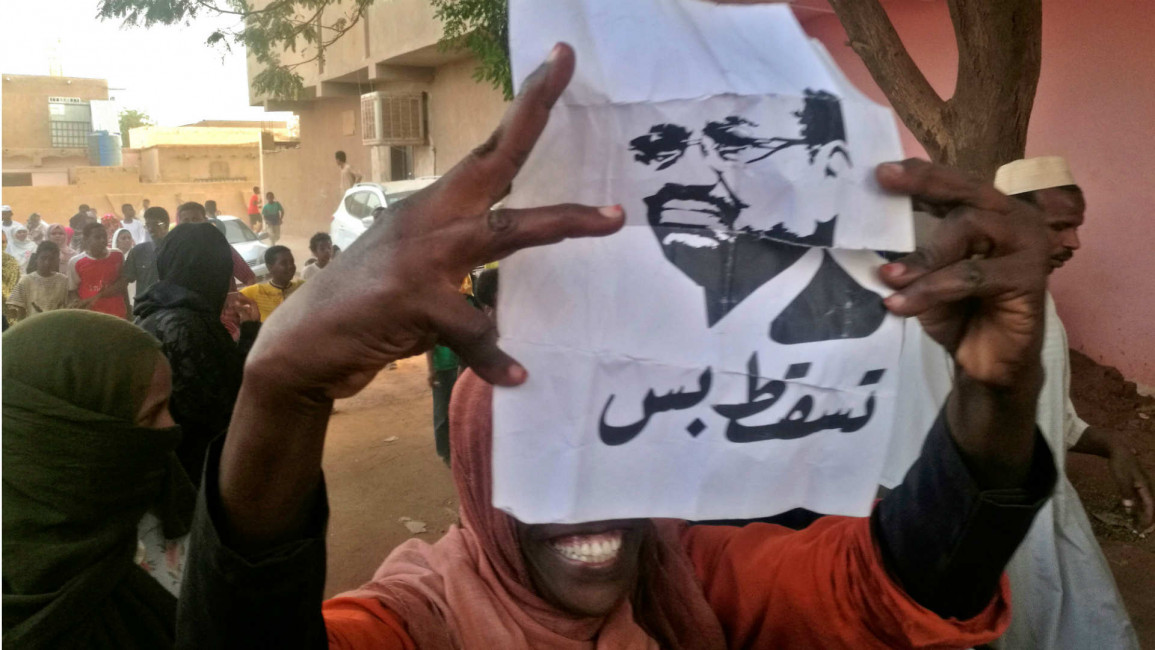Sudanese press suffers as Bashir intensifies crackdown on protests
Two Sudanese journalists will appear in court on Wednesday for their coverage of protests in the country, which are now in their third month. Sudan's President Omar al-Bashir officially banned the protests on Monday as part of an intensifying crackdown on dissent, during which the press has become a significant target.
Journalists Khalid Fathi and Hamad Suleiman, colleagues at the al-Tayyar newspaper, will appear before the Khartoum East Court, while journalist Tegi Osman will be tried in March under a similar complaint over his coverage of the peaceful protests that have engulfed Sudan since mid-December, Radio Dabanga reported.
Bashir's regime has arrested 79 journalists since the protests began, the Sudanese Journalists' Network said last week.
Editor-in-Chief of al-Tayyar, Osman Mirghani, has been held in detention since Friday.
While Sudanese courts dropped several charges against journalists on Monday, the independent Sudanese press has suffered under Bashir's crackdown on the protests.
Sudan's much-feared National Intelligence and Security Service (NISS) sources told al-Jareeda newspaper last week that the newspaper would have to submit its output daily to the security services for "correction and approval".
Al-Jareeda's administration decided neither to submit to censorship or publish regardless. Instead, it will pursue legal action, Radio Dabanga reported.
|
|
The Sudanese press was "the first to pay the price" after Friday's declaration of a state of emergency in the country, the Sudanese Journalists' Network said.
"The network will continue its activities in exposing the security service's plan, which works to terrorise and intimidate journalists and confiscate the freedom of press," it added.
Popular protests against the Bashir regime continued on Tuesday throughout the country, a day after the president banned unauthorised rallies. Bashir also banned strikes and publishing news that "hurts the citizens or the constitutional system", and security forces were granted sweeping new powers.
The NISS now have the power to search any building, restrict the movement of people and public transport, arrest individuals suspected of a crime of violating the emergency law and seize assets or property during investigations. Sudanese citizens are now also banned from stockpiling fuel and traveling with more than $3,000 or 150g in gold.
|
|
Emergency prosecutorial bodies will be set up to deal with those arrested under the new laws, Sudan's public prosecutor said on Tuesday.
Bashir reshuffled his senior military staff on Tuesday, as well as appointing a new defense minister. Former Defence Minister Awad Ibnouf was appointed vice president on Friday, when the president appointed military generals as governors of Sudan's 18 provinces.
The military reshuffle could mean Bashir is replacing the generals appointed as regional governors, but critics say it signals a deadly turn towards a military state.
"These are normal, routine changes that happen from time to time," a military spokesman said.
Access to social media sites, blocked by Sudanese telecom companies on regime orders since mid-December, was reopened on Tuesday. Sudanese activists speculated that the decision was made in conjunction with Bashir's banning of protests in order for the regime to track communications more easily. Until now, Sudanese users have accessed social media sites using Virtual Private Networks (VPNs), making their communications harder for the regime to access.
A joint statement on Tuesday by the US, UK, Norway and Canada said they were "deeply concerned" with Bashir's actions over the past week.
Protests erupted when a government decision to cut surpluses led to tripled bread prices, exacerbating the financial situation of many in a country which has witnessed a severe economic decline in recent years.
The bread protests quickly spread across the country and took on a more broad political message - calling on Bashir, who took power in a 1989 military coup, to step down.
Sudanese officials claim 30 people have died in protest-related violence, but activists put the tally at 57. They also say some of those killed died under torture. Human Rights Watch says at least 51 have been killed during the brutal crackdown.



